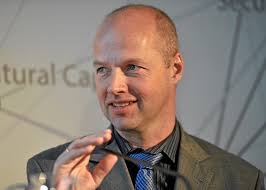Sebastian Thrun [1967-0] German    
Rank: 101
Scientist, CEO of Udacity
Sebastian Thrun is an innovator, entrepreneur educator, and computer scientist from Germany. He was CEO and cofounder of Udacity. Before that, he was a Google VP and Fellow, and a Professor of Computer Science at Stanford University. At Google, he founded Google X. He is currently also an Adjunct Professor at Stanford University and at Georgia Tech.
Intelligence, Car, Education, Learning, Science, Technology, Attitude, Change, Communication, Computers, Failure, Fear, Movies, Sad, Success |  |